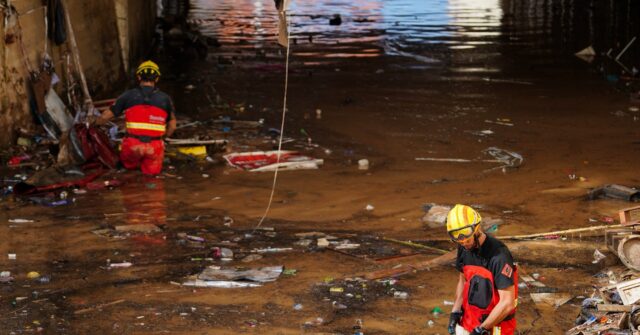In a devastating Response to the recent catastrophic floods in eastern Spain, Prime Minister Pedro Sánchez has declared the mobilization of an additional 5,000 soldiers and 5,000 police officers to the Valencia region. The floods, described as the deadliest natural disaster in Spain’s history, have claimed the lives of over 200 individuals. Current statistics reveal that 205 bodies have been recovered: 202 from Valencia, while others were found in the neighboring regions of Castilla La Mancha and Andalusia. As rescue efforts continue, the search remains ongoing for missing persons, with rescuers combing through stranded vehicles and inundated buildings.
The floods that struck this week have had a profound impact on communities throughout the eastern part of the country, causing widespread destruction and lasting trauma. Rescue operations are being undertaken not only by professional responders but also by thousands of volunteers who are working tirelessly to assist in cleanup and recovery efforts. The aftermath of the disaster has left many towns covered in thick mud, making the work challenging but crucial for restoring normalcy. The spirit of solidarity is palpable, as citizens come together to aid their neighbors and initiate the healing process in the hardest-hit areas.
Currently, the emergency response involves around 2,000 soldiers who are playing a vital role in the recovery efforts. Additionally, the Civil Guard gendarmes, numbering nearly 2,500, have accomplished an impressive 4,500 rescues during the ongoing crisis. This coordinated effort exemplifies the resilience and determination of the Spanish people facing such an unprecedented situation. Meanwhile, approximately 1,800 national police officers are also engaged in various emergency operations, ensuring public safety and order amid the chaos.
As the scale of the disaster becomes clearer, the community’s grief deepens. Many individuals grapple with the harsh reality of loss as they search for the missing and mourn their loved ones. The emotional toll of such tragedies is profound, leading to an outpouring of sympathy both locally and from across the nation. As recovery efforts continue, there is a pressing need to address not only the physical devastation but also the emotional and psychological ramifications for those affected by the floods.
In the wake of the crisis, discussions have begun regarding prevention strategies and improved infrastructure to mitigate the risk of similar disasters in the future. Lessons learned from this harrowing experience may guide Spain’s approach to climate-related challenges, urging authorities to invest in better monitoring systems, drainage improvements, and emergency preparedness plans. The aim will be to ensure that communities are better equipped to handle extreme weather events, which are expected to become more frequent with climate change.
Ultimately, the unfolding tragedy in Valencia highlights the strength and resilience of the human spirit. Through unity and collaboration, affected communities are beginning to rebuild, demonstrating their commitment to recovery and renewal. As they face the daunting task ahead, the solidarity shown by both volunteers and the national government serves as a beacon of hope for those impacted by the disaster. In the face of adversity, the shared determination to reconstruct lives and communities reflects the enduring capacity of individuals and societies to overcome even the most challenging circumstances.

